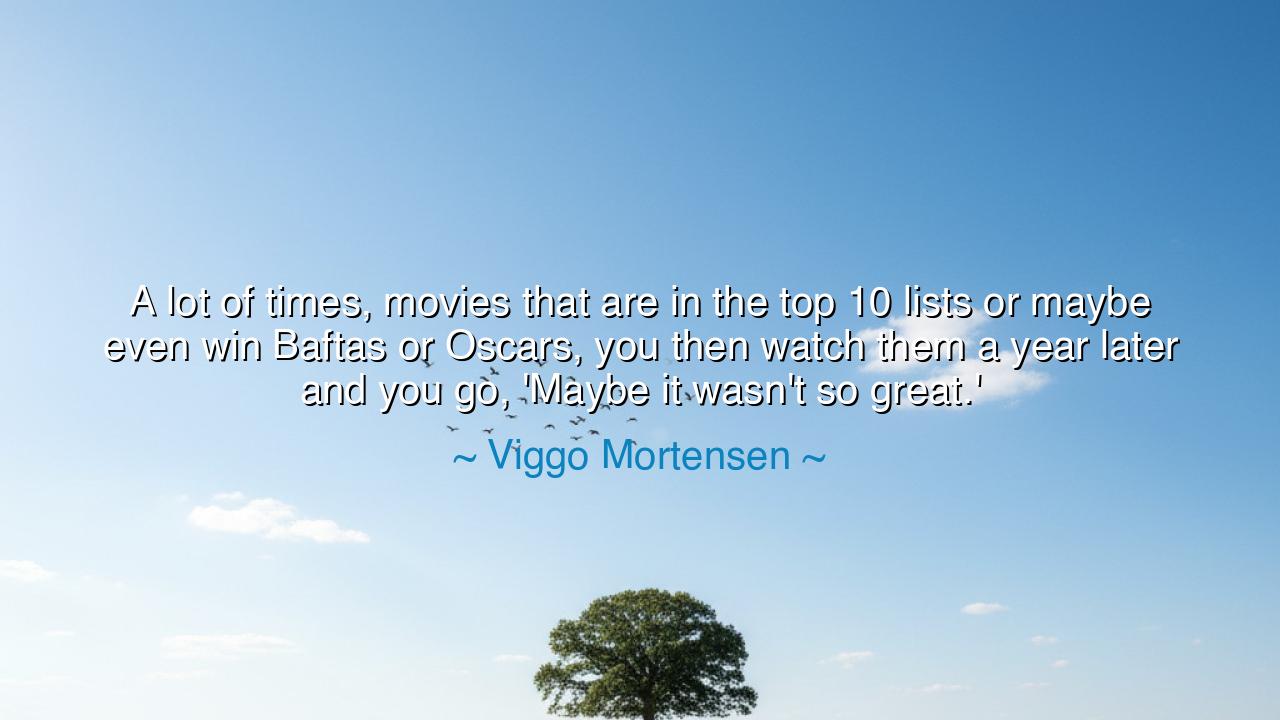
A lot of times, movies that are in the top 10 lists or maybe
A lot of times, movies that are in the top 10 lists or maybe even win Baftas or Oscars, you then watch them a year later and you go, 'Maybe it wasn't so great.'






Hear the words of Viggo Mortensen, whose reflections on the fleeting nature of praise and acclaim offer insight into the impermanence of human judgment: “A lot of times, movies that are in the top 10 lists or maybe even win Baftas or Oscars, you then watch them a year later and you go, ‘Maybe it wasn’t so great.’” These words, seemingly simple, carry the weight of timeless wisdom, reminding us of the fragile nature of fame, awards, and the judgments that follow them. Mortensen speaks not only of movies, but of the very transience of human recognition—how praise, however grand, often fades in the light of time, and what once seemed extraordinary may lose its luster.
In the ancient world, the Greeks understood the impermanence of fame. Homer, in his great epics, wrote of heroes who were celebrated for their bravery, only for time to reveal their flaws. The tragic figures of Sophocles’ plays, though admired for their nobility, often revealed themselves to be mere mortals, subject to the same fate and limitations as all men. Mortensen's words resonate with this ancient understanding—awards and recognition are but fleeting shadows, and the true measure of greatness is not found in the applause of the moment, but in the lasting impact of the work itself.
Consider the tale of Alexander the Great, whose conquests were celebrated in his time, but whose empire crumbled after his death. The world once thought him invincible, yet time, with its patient hand, revealed the fragility of all empires. Alexander’s fame was immense, but it was not his lasting greatness. His legacy, like the movies Mortensen mentions, was subjected to the test of time. Mortensen's reflection speaks to this very truth: the highs of today can be reduced to dust tomorrow, and what we hold as extraordinary may, in time, appear less so.
Mortensen's statement also speaks to the wisdom of impermanence, a theme often explored in ancient philosophy. Buddha, in his teachings, spoke of the impermanence of all things—how everything, no matter how cherished, is subject to change and decay. The awards and praise that may be bestowed upon a work today will, with time, lose their significance. What once held great weight may one day be viewed as ordinary, or worse, forgotten. This is the nature of all human endeavors: impermanence is a constant, and nothing, not even the most celebrated works of art or cinema, is immune.
Think also of the works of William Shakespeare, whose plays have withstood the test of time, yet even his works were not immune to changing tastes. When first performed, many of his plays were not the lofty masterpieces we now consider them, but the entertainment of the masses. It was only time and the subsequent reinterpretations of his works that elevated them to their present status. Mortensen’s words are a gentle reminder that greatness, though often recognized in the moment, is ultimately shaped by time, reflection, and reinterpretation.
Thus, O seekers, the lesson is clear: do not place all your trust in the fleeting recognition of the present moment, for it is time that will reveal what is truly great. Whether it is the acclaim for a film, the triumph of an empire, or the recognition of a hero, remember that true greatness is not dependent on awards or praise, but on the depth and truth of the work itself. In your own pursuits, whether in art, knowledge, or leadership, seek not the momentary applause, but the lasting impact you can have on the world.
In your own life, remember, O future generations, that recognition is fleeting. Like the heroes of old, whose names were sung and then forgotten, so too will your moments of greatness pass. Instead of seeking the accolades of today, aim to create something that will endure, that will be re-evaluated and re-discovered with time. Just as Shakespeare’s works rose above the judgments of his time, let your own actions be guided by integrity and purpose, not by the fleeting applause of the present. For it is not the recognition we receive today that defines us, but the legacy we leave behind for future generations.






AAdministratorAdministrator
Welcome, honored guests. Please leave a comment, we will respond soon